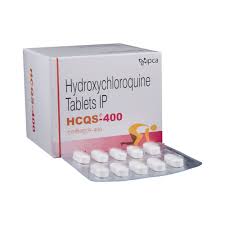How does hydroxychloroquine treat autoimmune disease?

Hydroxychloroquine 400 mg (HCQ) is a medication that has been used for decades to treat various autoimmune diseases, particularly rheumatoid arthritis (RA), systemic lupus erythematosus (SLE), and other conditions like Sjögren’s syndrome and dermatomyositis. It is part of a class of medications known as antimalarials and has shown effectiveness in managing symptoms and reducing disease activity in autoimmune disorders. Here’s a comprehensive guide on how Hydroxychloroquine 400 mg dose works and its role in treating autoimmune diseases:
Understanding Autoimmune Diseases:
Autoimmune diseases occur when the immune system, which normally protects the body from infections and other harmful substances, mistakenly attacks healthy tissues. This immune response leads to inflammation, tissue damage, and a range of symptoms depending on the specific condition. Common autoimmune diseases treated with hydroxychloroquine include:
- Rheumatoid Arthritis (RA): A chronic inflammatory disorder that primarily affects the joints, causing pain, swelling, stiffness, and potentially joint deformities.
- Systemic Lupus Erythematosus (SLE): A multisystem autoimmune disease that can affect various organs and tissues, leading to symptoms such as skin rashes, joint pain, fatigue, and kidney involvement.
- Sjögren’s Syndrome: An autoimmune disorder that primarily affects the salivary glands and tear-producing glands, causing dry mouth and dry eyes.
- Dermatomyositis: A rare autoimmune disease that involves inflammation of muscles and skin, leading to muscle weakness and skin rash.
Mechanism of Action:
1. Anti-inflammatory Properties
Hydroxychloroquine exerts its therapeutic effects through several mechanisms, primarily by modulating the immune response and reducing inflammation:
- Inhibition of Toll-like Receptors (TLRs): TLRs play a crucial role in initiating the immune response to pathogens. Hydroxychloroquine inhibits TLR signaling pathways, thereby reducing the production of pro-inflammatory cytokines such as tumor necrosis factor-alpha (TNF-α) and interleukin-6 (IL-6).
- Interference with Antigen Presentation: Hydroxychloroquine interferes with the processing and presentation of antigens by antigen-presenting cells (APCs) to T cells, which are central to the adaptive immune response. This helps dampen the exaggerated immune response seen in autoimmune diseases.
- Suppression of Autoantibody Production: In autoimmune diseases like SLE, abnormal production of autoantibodies targeting the body’s own tissues contributes to disease pathology. Hydroxychloroquine can reduce the production of these autoantibodies by interfering with their formation and promoting immune tolerance.
2. Effects on Cellular Function
- pH Modulation in Endosomes: Hydroxychloroquine accumulates in acidic compartments within cells, such as endosomes and lysosomes. By raising the pH within these compartments, it impairs processes such as antigen processing and toll-like receptor signaling, which are critical for immune activation.
- Inhibition of Autophagy: Autophagy is a cellular process involved in maintaining cellular homeostasis and clearing damaged components. Hydroxychloroquine inhibits autophagy, which can influence immune cell function and reduce inflammation in autoimmune diseases.
Clinical Applications:
1. Rheumatoid Arthritis (RA)
- Benefit: Hydroxychloroquine is commonly used as a disease-modifying antirheumatic drug (DMARD) in RA to reduce joint inflammation, pain, and stiffness.
- Evidence: Studies have shown that hydroxychloroquine can improve clinical outcomes, reduce disease activity scores, and decrease the need for other medications such as corticosteroids in RA patients.
2. Systemic Lupus Erythematosus (SLE)
- Benefit: Hydroxychloroquine is considered a cornerstone of treatment in SLE due to its ability to reduce disease flares, skin manifestations, and organ involvement.
- Evidence: Long-term use of hydroxychloroquine in SLE patients has been associated with lower disease activity, reduced risk of lupus flares, and improved overall survival rates.
3. Sjögren’s Syndrome
- Benefit: Hydroxychloroquine is used in Sjögren’s syndrome to alleviate symptoms of dry mouth and dry eyes, as well as to reduce systemic inflammation.
- Evidence: Studies have shown improvements in salivary flow rates, reduction in fatigue, and decreased inflammatory markers with hydroxychloroquine treatment in Sjögren’s syndrome.
4. Dermatomyositis
- Benefit: Hydroxychloroquine may be used adjunctively in dermatomyositis to manage skin rash and muscle inflammation, although its efficacy is less well-established compared to other autoimmune diseases.
- Evidence: Limited studies suggest potential benefits in reducing skin lesions and improving muscle strength in some patients with dermatomyositis.
Safety and Side Effects:
Hydroxychloroquine is generally well-tolerated, especially when used at recommended doses and under medical supervision. However, like any medication, it can cause side effects:
- Gastrointestinal Symptoms: Common side effects include nausea, vomiting, diarrhea, and abdominal discomfort.
- Ocular Effects: Long-term use of hydroxychloroquine can rarely lead to retinopathy (damage to the retina), which is why regular eye exams are recommended for patients on prolonged treatment.
- Dermatological Reactions: Skin reactions such as rash or itching may occur, although these are usually mild and transient.
- Cardiac Effects: Hydroxychloroquine can rarely cause cardiac arrhythmias, particularly in individuals with pre-existing heart conditions.
Monitoring and Considerations:
Patients prescribed hydroxychloroquine for autoimmune diseases should undergo regular monitoring:
- Ophthalmologic Monitoring: Baseline and periodic eye exams are crucial to detect early signs of retinopathy.
- Clinical Monitoring: Regular clinical assessments are needed to monitor disease activity, assess treatment response, and manage any potential side effects.
- Laboratory Monitoring: Periodic blood tests may be required to monitor blood cell counts, liver function, and kidney function, especially during long-term therapy.
Conclusion:
Hydroxychloroquine plays a valuable role in the treatment of various autoimmune diseases by modulating the immune response, reducing inflammation, and improving clinical outcomes. It is widely used in conditions such as rheumatoid arthritis, systemic lupus erythematosus, and Sjögren’s syndrome, where it helps alleviate symptoms and prevent disease flares. While generally well-tolerated, careful monitoring for potential side effects, especially ocular toxicity, is essential. By working closely with healthcare providers and adhering to treatment guidelines, patients can effectively manage their autoimmune conditions and improve their quality of life with hydroxychloroquine therapy.



